#msme day
Explore tagged Tumblr posts
Text
WORLD MSME DAY: Over 1000 young professionals line up
Over 1000 young professionals across the Niger Delta region would, on June 27, converge in Port Harcourt, the Rivers State capital for the 4th Niger Delta MSME Summit/Bootcamp. The event, which is an initiative of the Niger Delta Young Professionals (NDYP) is strategic, as it coincides with the 2024 United Nations World MSME Day. The World MSME Day is specially marked to create a platform to…

View On WordPress
0 notes
Text

#car loan#fast cash loans online#home loan#instant loan#loan#loan against property#loan apps#msme loan#personal loans#same day payday loans
0 notes
Text

#instant loan#loans#short term loans direct lenders#same day loans online#same day loans direct lenders#short term loans uk#auto title loans#home loan#mortgage loan#msme loan#personal loans#student loans#same day payday loans#bad credit loans#car collateral loans#business loan#direct payday loan lenders#loan#fast cash loans online#car loan#loan against property#financial planning
0 notes
Text
Online Workshop on Artificial Intelligence Tools for Professionals
Date: August 21-22, 2023
Time: 9:30 am to 5:00 pm
Duration: 2 days
Organizers: @National Institute for Micro, Small, and Medium Enterprises (#NIMSME) and @CSDSE Pvt. Ltd.
Contents of the Program:
How to talk to AI (Prompt Engineering): Learn how to effectively communicate with AI systems and optimize prompts for desired outputs.
Meeting efficiency using AI: Explore AI tools and techniques to enhance meeting productivity, automate tasks, and streamline communication.
Working with Excels using AI: Discover how AI can assist in data analysis, automation, and predictive modeling within Excel spreadsheets.
Working with PowerPoint using AI: Learn how AI can improve the creation, design, and delivery of impactful presentations in PowerPoint.
Research using AI: Gain insights into leveraging AI algorithms and tools to enhance research methodologies, data analysis, and knowledge discovery.
Job hunting using AI: Understand how AI-powered tools can aid in job search optimization, resume screening, interview preparation, and career guidance.
Day-to-day tasks using AI: Explore the application of AI in simplifying and automating routine tasks, increasing productivity, and improving work-life balance.
Why Attend:
Enhance your productivity: Acquire valuable skills and knowledge on using AI tools to streamline tasks, automate processes, and optimize efficiency in your professional work.
Stay updated with AI advancements: Get exposed to the latest trends, techniques, and tools in the field of artificial intelligence, empowering you to stay ahead in your industry.
Expand your network: Connect with professionals from diverse industries, including finance, marketing, healthcare, IT, research, consulting, and more, fostering collaboration and potential partnerships.
Gain practical insights: Acquire hands-on experience through practical sessions and case studies, enabling you to immediately apply AI tools and techniques to real-world scenarios.
Who Can Attend: The workshop is designed for professionals from various industries, including but not limited to finance, marketing, healthcare, IT, research, consulting, and academia. It is also beneficial for researchers, academics, and job seekers interested in leveraging AI tools for improved productivity and career growth.
#Artificial Intelligence #Online #Workshop#Professionals @AI #Tools, #Prompt #Engineering, #Meeting #Efficiency, #Excel, #PowerPoint, #Research, #Job Hunting, #Day-to-day #Tasks, #Productivity, #Networking, #Professionals, #Researchers, #Academics, #Job Seekers

#msme registration#msme loan#msme sector#msmeindia#Artificial Intelligence#Online#Workshop#Professionals @AI#Tools#Prompt#Engineering#Meeting#Efficiency#Excel#PowerPoint#Research#Job Hunting#Day-to-day#Tasks#Productivity#Networking#Professionals#Researchers#Academics#Job Seekers
1 note
·
View note
Text
Countdown to JEE (Main): Week 5/33



In terms of question-solving, this has been the most unproductive week yet by a long shot. I've been sick for a few days but mostly I've lost a lot of time because I had to go to school a few days for various (annoying) reasons, and also because I'm very easily distracted and was burnt out this week for whatever reason.
Test results:
Test at physics tuition center (JEE (Advanced) pattern): 107/130, rank 1/67 I'M SO HAPPY!!!!!!!!!!!!
Online test for mathematics tuition (JEE (Advanced) pattern): 62/112, rank 22/425. I kind of fucky-uppied this one :D
Aryabhatta National Mathematics Competition: 100%, selected for interview round — however, everyone on the internet is saying it's a scam, and also it's under MSME — which is weird — so I'm not going any further for this one.
Topics covered:
Physics: Current Electricity; Simple Harmonic Motion; Modern Physics; Alternating Current (4/3)
Chemistry: Alcohols, Phenols and Ethers; Aldehydes and Ketones; Carboxylic Acids (3/3)
Mathematics: Quadratic Equations; Functions (2/3)
Questions solved:
Physics: - Physics tuition Current Electricity module, single-correct, multiple-correct, matching and comprehension — 137 questions, 116 correct - Allen Simple Harmonic Motion student question bank — 32 questions, 32 correct - Physics tuition Atoms and Nuclei module, single-correct — 30 questions, 25 correct Total: 199/60 questions, 171 correct
Chemistry: - Kota Question Bank, Alcohols, Ethers and Epoxy, single-correct, reasoning and multiple-correct — 59 questions, 45 correct - Allen Ionic Equilibrium module, O1 and O2 — 102 questions, 93 correct Total: 161/60 questions, 138 correct
Mathematics: - Black Book Quadratic Equations, multiple-correct and comprehension — 67 questions, 57 correct Total: 67/60 questions, 57 correct
GRAND TOTAL: 427/400 questions, 366 correct
I'M SO SORRY GUYS I WILL DO MY ABSOLUTE BEST TO MAKE UP NEXT WEEK PLEASE FORGIVE ME
Upcoming tests:
11/07 (Thursday) — Test at physics tuition center. Topics: Current Electricity; Newton's Laws of Motion; Aldehydes and Ketones; Carboxylic Acids; Amines
See you again next week!
#studyblr#desi studyblr#study blog#jee 2025#joint entrance examination#jee mains#jee advanced#weekly studyposting#porashona
14 notes
·
View notes
Text
The Grand Inauguration of Rising Rajasthan Global Investment Summit 2024: Col Rajyavardhan Rathore
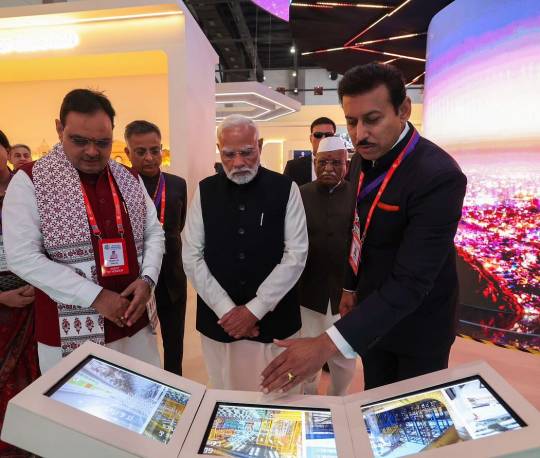
The Rising Rajasthan Global Investment Summit 2024, a flagship event to drive economic transformation in Rajasthan, kicked off with grandeur in Jaipur. Inaugurated by Prime Minister Narendra Modi, the summit is poised to position Rajasthan as a leading investment hub. Col Rajyavardhan Rathore, a key figure in promoting this initiative, emphasized the summit’s role in shaping the future of Rajasthan’s economy.
A Visionary Start: The Inauguration Ceremony
The inauguration ceremony was nothing short of a spectacular display of Rajasthan’s cultural richness and economic ambitions. PM Modi, along with dignitaries from across the globe, lit the ceremonial lamp, marking the beginning of a three-day extravaganza aimed at attracting investments across various sectors.
Keynote by PM Modi
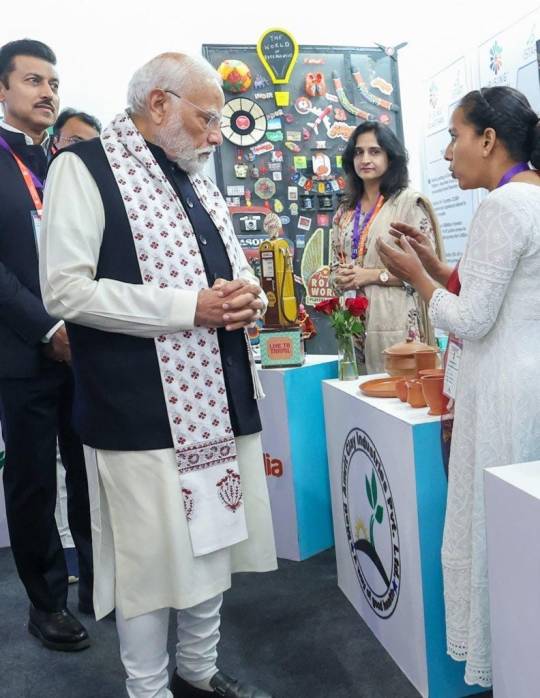
Col Rajyavardhan Rathore’s Address
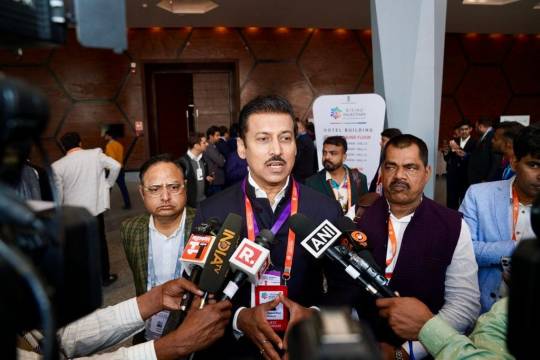
Key Themes of the Summit
1. Investment in Renewable Energy
Rajasthan, blessed with ample solar and wind resources, aims to be a leader in renewable energy. The summit highlights projects aimed at making the state a green energy hub.
2. Boosting Tourism and Heritage
Rajasthan’s rich cultural heritage is a focal point, with plans to modernize infrastructure while preserving its historical charm.
3. Technology and Startups
The event places significant emphasis on fostering innovation through support for startups, IT hubs, and the burgeoning AVGC (Animation, Visual Effects, Gaming, and Comics) sector.
4. Agricultural and Rural Development
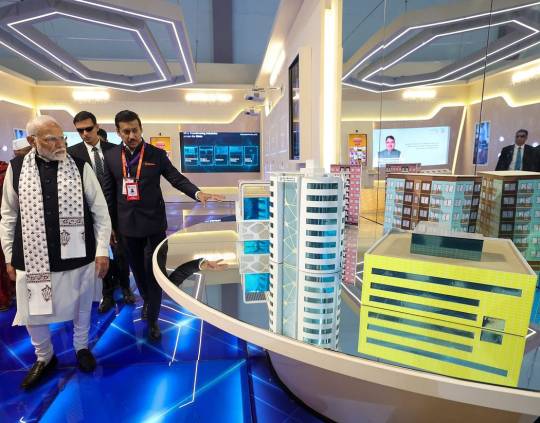
Event Highlights
International Participation
The summit sees delegates from over 30 countries, including CEOs, diplomats, and investors, exploring collaborations in various industries.
Policy Announcements
The Rajasthan government has introduced policies tailored to attract investments, including tax incentives, streamlined approvals, and support for startups and MSMEs.
Exhibition and Networking Opportunities
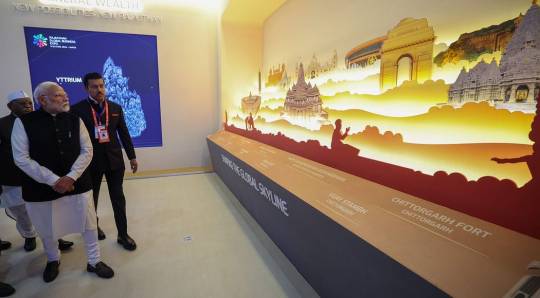
Impact on Rajasthan’s Economy
Billions in Investment Commitments
The summit is expected to secure significant investments in key sectors, boosting Rajasthan’s GDP and job market.
Job Creation
With investments in industrial hubs, green energy projects, and tourism, thousands of job opportunities are set to emerge, particularly for the youth.
Infrastructure Development
Infrastructure upgrades, including smart cities, roads, and industrial parks, will lay the foundation for sustained growth.
Col Rajyavardhan Rathore: Championing Rajasthan’s Growth
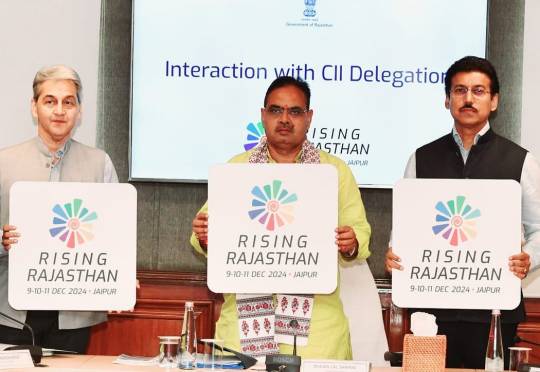
A Bright Future for Rajasthan
The Rising Rajasthan Global Investment Summit 2024 is more than an event; it’s a movement to propel Rajasthan into a new era of growth and global recognition. With leaders like Col Rajyavardhan Rathore and the support of the central government, the future looks exceptionally promising for the state and its people.
4 notes
·
View notes
Text
#RisingRajasthan | PM Narendra Modi to Inaugurate the ‘Rising Rajasthan Global Investment Summit’ in Jaipur: Col Rajyavardhan Rathore

The much-awaited Rising Rajasthan Global Investment Summit 2024 is set to commence in Jaipur this Monday, with Prime Minister Narendra Modi inaugurating the three-day event. Colonel Rajyavardhan Rathore, a prominent leader from Rajasthan, has extended his warm welcome to delegates from across the globe, emphasizing the transformative potential of this summit for the state.
The Vision Behind Rising Rajasthan
The summit is a strategic initiative to position Rajasthan as a key destination for global and domestic investments. With its vibrant culture, abundant resources, and innovative policies, Rajasthan is all set to emerge as a leader in sustainable and inclusive economic growth.
Col Rajyavardhan Rathore’s Statement on the Summit
Col Rathore highlighted the significance of the event, stating: “The Rising Rajasthan Summit reflects our commitment to fostering growth and creating opportunities for all. With PM Narendra Modi’s leadership, this summit will set a new benchmark in investment and development for the state.”
Key Highlights of the Rising Rajasthan Summit
1. Grand Inauguration by PM Modi
PM Narendra Modi’s presence underscores the national importance of this summit. His vision of “Sabka Saath, Sabka Vikas” aligns perfectly with the summit’s goals.
2. Focus on Investment Across Sectors
The event will emphasize key growth areas such as:
Renewable energy and green initiatives.
Tourism and heritage conservation.
Startups and emerging technologies.
Agriculture, food processing, and rural development.
3. International Participation
Delegates from over 25 countries, including global CEOs, diplomats, and investors, will attend, paving the way for international collaborations.
4. Policy Announcements
The Rajasthan government is expected to unveil new investment-friendly policies and incentives to attract businesses.
Why Jaipur? A Strategic Location for Growth
Jaipur, the capital of Rajasthan, serves as a perfect venue for this summit due to its strategic location, excellent infrastructure, and historical significance. The city is rapidly evolving into a business hub, blending tradition with modernity.
Expected Outcomes of the Summit
1. Major Investment Commitments
The summit aims to secure billions in investments, ensuring growth across industries.
2. Job Creation
With large-scale investments, the event is set to generate thousands of job opportunities for Rajasthan’s youth.
3. Infrastructure Development
From smart cities to industrial hubs, the summit promises substantial infrastructure upgrades across the state.
4. Boost to MSMEs and Startups
Dedicated sessions will support small businesses and startups, encouraging innovation and entrepreneurship.
Col Rathore’s Role in Promoting Rising Rajasthan
As a visionary leader and advocate for Rajasthan’s growth, Col Rajyavardhan Rathore has actively championed initiatives to bring global attention to the state. He believes that the summit will not only drive economic development but also uplift local communities.
A Game-Changer for Rajasthan
The Rising Rajasthan Global Investment Summit 2024 is poised to redefine the economic landscape of the state. With PM Modi’s inauguration and the active participation of global investors, this event symbolizes the beginning of a new chapter in Rajasthan’s development journey. Col Rajyavardhan Rathore’s unwavering commitment ensures that the summit’s outcomes will benefit every section of society, truly embodying the spirit of a “Rising Rajasthan.”
3 notes
·
View notes
Text
Where to Buy GI Flanges at the Best Price in Delhi
Galvanized Iron (GI) flanges are widely used across industries for their durability, corrosion resistance, and cost-effectiveness. Whether it’s for piping, water distribution, or other industrial applications, GI flanges are an essential component in many projects. For businesses in Delhi, finding GI flanges at the best price can significantly impact overall costs. In this article, we’ll explore where to buy GI flanges in Delhi while ensuring quality and affordability.
Why Choose GI Flanges?
GI flanges are made by coating iron or steel with a layer of zinc, which protects the material from rust and corrosion. This makes them ideal for use in environments exposed to moisture, chemicals, or harsh weather conditions. Some key benefits of GI flanges include:
Corrosion Resistance: The zinc coating provides long-lasting protection against corrosion, ensuring the flange remains durable over time.
Cost-Effective: Compared to other materials, GI flanges offer excellent value for money without compromising on quality.
Low Maintenance: Due to their resistance to environmental factors, GI flanges require less maintenance, leading to lower long-term costs.
Best Place to Buy GI Flanges in Delhi: Udhhyog
When it comes to sourcing GI flanges at the lowest price in Delhi, Udhhyog is the go-to manufacturer and supplier. Udhhyog offers a wide range of GI flanges that cater to various industrial applications. Their competitive pricing and commitment to quality make them a top choice for businesses looking to procure flanges in Delhi and across India.
Why Buy from Udhhyog?
Lowest Price Guarantee: Udhhyog is known for offering GI flanges at the best price in Delhi. Their direct manufacturing process cuts out the middlemen, allowing them to provide affordable rates without compromising on quality.
High-Quality Products: All flanges at Udhhyog undergo rigorous quality checks to ensure they meet industry standards. The zinc coating is applied uniformly, ensuring corrosion resistance and longevity.
Variety of Flanges: Whether you need weld neck flanges, slip-on flanges, blind flanges, or socket weld flanges, Udhhyog offers a comprehensive selection to suit different needs.
Credit Option for MSMEs: Udhhyog supports the growth of small and medium enterprises by offering a 45-day credit option, making procurement easier and helping businesses manage their cash flow efficiently.
Reliable Delivery: With an efficient supply chain and well-established distribution network, Udhhyog ensures timely delivery of products, so your projects stay on track.
Other Notable Suppliers in Delhi
While Udhhyog is a top recommendation for GI flanges in Delhi, here are a few other suppliers that offer competitive prices:
Bansal Pipe Industries: Known for their quality pipe fittings and flanges, Bansal Pipe Industries offers reasonable pricing for bulk orders.
Jindal Pipes Ltd.: A well-established brand in the pipe and flange industry, Jindal Pipes supplies GI flanges across Delhi at competitive rates.
Steel Mart India: Offering a wide range of industrial flanges, Steel Mart India is another reliable supplier for GI flanges in Delhi.
Tips for Buying GI Flanges at the Best Price
Compare Prices: While Udhhyog offers the lowest price, it’s always a good idea to compare prices across different suppliers before making a bulk purchase.
Check for Certifications: Ensure the supplier adheres to industry standards and provides certifications of quality to avoid substandard products.
Bulk Discounts: Many suppliers offer discounts on large orders, so inquire about bulk pricing options.
#GIFlangesBestPrice#DelhiFlangeSupplier#AffordableFlanges#IndustrialFlangesDelhi#BuyGIFlanges#FlangeManufacturer#GIPipeFittings#FlangesDelhi#BestPriceFlanges#UdhhyogFlanges
5 notes
·
View notes
Text

Happy World MSME Day!
Today, we celebrate the heart and soul of our global economy: the Micro, Small, and Medium-sized Enterprises (MSMEs). These incredible businesses are the backbone of our communities, driving innovation, creating jobs, and fostering sustainable growth.
.
Call Us: 9520886860
.
#IIMTIndia#IIMTNoida#IIMTGreaterNoida#IIMTDelhiNCR#IIMTian#IIMTCollege
#WorldMSMEDay#SupportSmallBusiness#Innovation#EconomicGrowth#SustainableDevelopment#MSME2024
3 notes
·
View notes
Text

Smooth sailing through registrar of company filings with our expert team by your side. ✍ ~ ~ ~ ✅ Company Registration ✅ GST Registration & Return ✅ Trademark Registration ✅ Income Tax Return ✅ FSSAI Registration
Maurvish Advisors is an MCA (Ministry of Corporate Affairs) & MSME registered company in India. Our experienced (10 Yrs+) CA/CS will draft & complete all the documentations on the same day.
✅ Hassle Free Process ✅ 100% Online Process ✅ Lowest Cost in India
What are you waiting for? Apply Now
#tumblr#aesthetic#love#like#tumblrgirl#follow#instagram#instagood#photography#likeforlikes#s#art#likes#tumblrboy#frasi#grunge#girl#o#cute#fashion#sad#photooftheday#photo#frases#followforfollowback#frasitumblr#a#amor#tumblraesthetic#tiktok
2 notes
·
View notes
Text
Why Many MSMEs in India Overlook HRMS and What Are They Missing
MSMEs in India Overlook HRMS
The MSME sector is a major contributor to India’s GDP. However, it can do even better if many of its companies switch from the traditional methods of managing their human resources to using HRMS. When empowered with a capable HRMS, their HRs can complete tasks faster and better while still having the time to accomplish more.
HRMS handles everything from payroll to employees’ professional growth. But even though the holistic advantages of using it are far-reaching, many MSMEs in India are not convinced. From misconceptions to lack of information about these systems, here are some of the biggest reasons why this is happening.
Why Do Indian MSMEs Not Use HRMS?
1. Strong Belief in Traditional Methods 2. Lack of Awareness About HRMS 3. More Emphasis on the Core Business Activities 4. Using Other Employees for HR Duties 5. Built for Bigger Companies
Benefits of Using HRMS in MSMEs
1. Stores Data Easily and Securely 2. Acts as a Resourceful Digital Arm for HRs 3. Saves Money and Increases Efficiency 4. Enhances Employee Satisfaction 5. Assists in Maintaining Statutory Compliance
Source Link
0 notes
Text
Escaping the Matrix
The reality is an illusion
By Faisul Yaseen
‘Khan News Agency’ just outside the Lambert Lane on the Residency Road in Srinagar, the summer capital of Jammu and Kashmir, used to employ seven persons. Today, Hilal Ahmad is the only one running the show.
“The customer flow used to be such that none of us could take a breather during the day,” Ahmad says. “Today, I sit idle, waiting all day for the customers to turn up.”
His business of selling newspapers, magazines, and other periodicals, has been hit with the growth of e-commerce in Kashmir.
“e-commerce is doing much more damage to small-time shopkeepers than the violence of three decades in Kashmir,” he says.
As the e-commerce industry is growing in Kashmir, it is eating away the business of Micro, Small and Medium Enterprises (MSME) like local departmental stores, bookshops, clothing and footwear stores, small traders, retailers, and hawkers while wholesale profit margins are getting squeezed.
In this new world order, how will the small businesses survive?
*****

Andrew Tate, a kickboxer-turned-online influencer was recently in the news when while being arrested he said, “The Matrix has attacked me.”
When Tate mentioned ‘The Matrix’, was he making a reference to the science fiction film franchise or was he talking about the new world order?
In one of his viral videos while referring to ‘The Matrix’, he says, “They want to control us. This is what people who are in charge ever wanted from the beginning, control. They want people to comply. And you have to put systems in place to ensure people comply.”
Are those systems the new business models? And are we the people complying with those systems?
Kashmir Chamber of Commerce and Industry (KCCI) President Javid Tenga says, “There is a need to support people who are losing their livelihood due to e-commerce.”
Tenga, who had shot a letter to the Union Civil Aviation Ministry and Director General of Civil Aviation (DGCA) to stop websites of various airlines from unilaterally raising airfares on Jammu and Kashmir route, says that the government needs to place restrictions on e-commerce of certain items to protect the interests of small traders.
Rescuing small businesses in a place like J&K assumes importance considering that at least 1.82 lakh youth who do not have any jobs are registered with the government.
*****
Chairman of PHD Chamber of Commerce and Industry (PHDCCI), Kashmir, Vicky Shaw says, “The dimensions of business are changing.”
He suggests small businesses to get associated with big companies and become their suppliers.
Shaw also recommends small traders to register their businesses on the Government of India’s Open Network Digital Commerce (ONDC) app for easy marketing of their products.
“People have to move on,” Shaw says.
Coordinator Directorate of Internal Quality Assurance (DIQA) of the University of Kashmir (KU), Aijaz Akbar Mir concurs with Shaw.
According to Mir, who specialises in Management and Organisational Behaviour, Human Resource Management, Human Resource Development and Industrial Relations, the small traders need to come up with “innovations” and “redesign” or “perish”.
“Change is important. What is relevant today may not be relevant tomorrow,” Mir says. “Small traders need to add more products and go for home delivery.”
Coordinator MBA Financial Management at KU’s School of Business Studies, Irshad Ahmad Malik questions whether small businesses were offering what customers want.
“They are not shifting to the alternate mechanism,” he says. “They also need to lure customers with discounts and go for hybrid mode of sales – both online and in store.”
*****
In a time of gloom at the shop fronts, is the government doing anything for helping the small businesses?
Director Industries and Commerce, Kashmir, Mahmood Ahmad Shah says, “There is nothing in the industrial policy. This comes under rehabilitation.”
However, Shah, who is also Director Handicrafts and Handloom, says that the government is incentivising e-commerce in the handicrafts sector.
When merchants, who usually fight with each other, feel an existential threat at the hands of the “common enemy” e-commerce, the role of the government and the quasi-government institutions like J&K Bank, which has for long been the lifeline of the local economy, becomes all the more important.
Editor of the J&K Bank and its Head of Internal Communication and Knowledge Management (IC&KM) Department, Sajjad Bazaz says, “It is all up to the business plan of the shopkeepers.”
He says that the loan limit given by the bank depends on the working capital.
“Many small traders have already started e-commerce but it only accounts for around 40 percent of the sales while 60 percent customers still visit the stores for a personal experience,” Bazaz says.
*****

In the 1999 Hollywood movie, ‘The Matrix’ that Tate makes references to, Morpheus, a rebel leader played by Laurence Fishburne tells the protagonist Neo, who is played by Keanu Reeves, “The Matrix is a system, Neo. That system is our enemy. But when you're inside, you look around, what do you see? Businessmen, teachers, lawyers, carpenters. The very minds of the people we are trying to save. But until we do, these people are still a part of that system and that makes them our enemy. You have to understand, most of these people are not ready to be unplugged. And many of them are so inured, so hopelessly dependent on the system, that they will fight to protect it.”
Are we those hopelessly dependent people who are fighting to protect this world order?
In ‘The Matrix’ Morpheus gives Neo two options, “This is your last chance. After this, there is no turning back. You take the blue pill - the story ends, you wake up in your bed and believe whatever you want to believe. You take the red pill - you stay in Wonderland and I show you how deep the rabbit hole goes.”
Do we have options like Neo and what are those options?
Writer and speaker, Sofo Archon in ‘Escaping the Matrix: 8 Ways to Deprogram Yourself’ writes, “Think of the way most people live: They force themselves to wake up early in the morning, dress up, drive straight to some workplace, spend 8 hours or so doing work they hate, drive back home, surf the Internet or watch TV, and then go to sleep, only to repeat the same routine the next day for almost the rest of their lives.”
For escaping ‘The Matrix’, he suggests breaking the shackles of dogmas, stopping giving your power away to external authority, questioning the dominant economic system, detaching yourself from consumerism, being aware of the media, choosing food carefully, reading eye-opening books, and developing mindfulness.
Archon writes that habits, tradition, and dogmas have turned us into mindless automatons that follow a predetermined path that was forced upon us.
*****
Chairman J&K Hoteliers Club Mushtaq Chaya says that there is a need to change these habits and old traditions.
“Shopkeepers have to become smart,” he says. “The people who are making a fortune out of e-commerce are smart people who used to run small businesses like these shopkeepers.”
However, Chaya calls for extending all possible help to these small traders who are finding it difficult to jump the bandwagon of e-commerce.
Like Chaya, President of Chamber of Commerce and Industry, Kashmir (CCIK), Tariq Rashid Ghani also suggests extending a helping hand to the small businesses keeping in mind the past three decades of turmoil in J&K.
“The traditional shop-keeping has come to an end,” he says. “The government needs to promote local items.”
*****

Nikki Baird in her write up ‘Retail in the 2020s: The Death of Consumerism’ for the ‘Forbes’ writes that the consumers should become sensitive to environment footprints; repair and maintenance sector would grow; businesses should deliver experiences; and traders should rethink how their businesses are organised, rework brand strategies, and remodel stores.
On April 17 last year at the unveiling of a 108-foot tall statue of Hanuman in Morbi, Gujarat, Prime Minister Narendra Modi said: “At our homes, we should only use things made by our people. Imagine the number of people who will get employment due to this. We may like foreign-made goods but these things don’t have the feel of the hard work of our people. In the next 25 years, if we just use local products, there won’t be unemployment for our people.”
In times of brand junkies, in times when duds backed by rich parents go on to become entrepreneurs, extending an olive branch to the small traders would be a revolutionary act.
*****

Greek philosopher Plato in the ‘Allegory of the Cave’ in his work ‘Republic’ describes a group of people who have lived all their lives in a cave. Chained to pillars, they can only see shadows cast on the back wall by a fire burned behind them. These shadows are mere illusions. When one of these men breaks out, he discovers a new world. On returning to the cave, he tells the other men about the reality but they reject it and resent him because reality is an illusion for them and illusion a reality.
However, Friedrich Nietzsche in his book Twilight of the Idols argues that if this ‘reality’ was completely unknowable and beyond grasp, what use could it possibly be.
Sheikh Aijaz, who runs Gulshan Books store at the Residency Road in Srinagar, says that a new reality has already dawned as fewer people were turning up to purchase books at stores.
“Most people now order books from e-commerce sites,” says Aijaz who compensates for the loss of business at the store with ‘Gulshan Books Publishing House’, a vertical the family started years back.
The 17th century French philosopher Rene Descartes in his ‘Meditations on First Philosophy’ suggests that the entire human world is but a world of shadows orchestrated by a deceitful “evil genius”.
Not wanting to chase the shadows, millennials across the world may not be buying diamonds, ‘vocal for local’ may be the in thing in India, but are we ready for putting in an effort to make the change.

Do you want to take the blue pill, or do you want to take the red pill?
The choice is yours.
3 notes
·
View notes
Text

#car loan#fast cash loans online#home loan#instant loan#loan#loan against property#loan apps#msme loan#personal loans#same day payday loans
0 notes
Text
Bad Cibil Loan Contact Me
#loans#short term loans uk#same day loans online#auto title loans#short term loans direct lenders#same day payday loans#same day loans direct lenders#personal loans#msme loan#mortgage loan
0 notes
Photo

#D2CTech Conference by Instamojo
Reserve your seat: https://justithosting.com/justit/d2ctech-conference-by-instamojo/ Visit Instamojo: https://justithosting.com/justit/instamojo/ https://justithosting.com/
The industry's best and brightest brains will convene over three days to give their two cents on nurturing and growing D2C brands and the tools, technology and platforms that power this growth.
#webinar #D2CTech #instamojo #conference #conference2023 #cootalks #businessowner #startuplife #payments #invoices #checkitout #paymentgateway #paymentprocessing #paymnetapp #paymentsolutions #payments #startups #startupbusiness #startupideas #startuptips #startupindia #startuplife #business #businessindia #smallbiz #SMB #MSME #msmeindia #MSMERegistration #webagency #webdevelopment #webdeveloper #webdevelopers #webdevelopmentcompany #websitedeals #wwwdeals #wwwoffer #webdesign #webdesigner #webdesigning #webdesignagency #webdesigncompany #webdesigners #webdesigntrends #webdesignanddevelopment #webdesigns #webdesignservices #webdevelopmentservices #webdev #webdevelopmentagency #webdevelopmentservice #webdevelopmentindia
4 notes
·
View notes